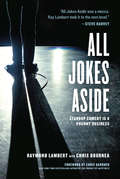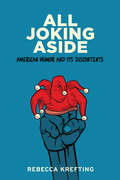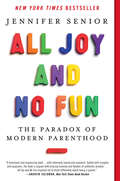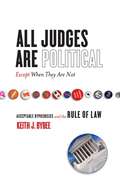- Table View
- List View
All Is Vanity
by Christina SchwarzALL IS VANITY is the second novel by Christina Schwarz, the acclaimed author of number-one bestseller DROWNING RUTH. 'A page-turner' New York Times Book ReviewAs they reach their mid-thirties, Margaret and Letty, best friends since childhood, begin to chafe at their sense that they are not where they ought to be in life. Margaret decides to quit her job and whips out a literary tour de force. But as Letty, a stay-at-home mother of four, begins to feel pressured to make a good showing in the upper-middle-class Los Angeles society, Margaret sees a plot unfolding that's better than anything she could make up. Desperate to finish her book and hungry for acclaim, she pushes Letty to take greater and greater risks and sacrifices one of the things most precious to her... Like DROWNING RUTH, ALL IS VANITY probes into the mysteries of the human heart and uncovers the passions that drive ordinary people to break the rules in pursuit of their own desires.
All Is Well: Heal Your Body with Medicines, Affirmations, and Intuition
by Mona Lisa Schulz Louise Hay"Whenever there is a problem, repeat over and over: All is well. Everything is working out for my highest good. Out of this situation only good will come. I am safe."In this healing tour de force, best-selling authors Louise L. Hay and Dr. Mona Lisa Schulz have teamed up for an exciting reexamination of the quintessential teachings from Heal Your Body. All Is Well brings together Louise’s proven affirmation system with Mona Lisa’s knowledge of both medical science and the body’s intuition to create an easy-to-follow guide for health and well-being. And, for the first time ever, they present scientific evidence showing the undeniable link between the mind and body that makes these healing methods work.Bringing focus and clarity to the effects of emotions on the body, All Is Well separates the body into seven distinct groups of organs – or emotional centers – that are connected by their relationship to certain emotions. Structured around these emotional centers, the authors outline common imbalances and probable mental causes for physical illness. They also include case studies that show a complete program for healing that draws from all disciplines, including both traditional and alternative medicine, affirmations, nutritional changes, and so much more.Using the self-assessment quiz, the holistic health advice, and an expanded version of Louise’s original affirmation chart, you can learn how to heal your mind and body with affirmations and intuition and live a balanced, healthy life.
All Is Well: Life Lessons from a Preacher's Father
by Kevin P. Martin Jr.A memoir of a parent&’s sudden passing from ALS, recalling life lessons learned and regaining faith in the process. Kevin P. Martin, Sr. was diagnosed with Lou Gehrig&’s Disease, better known as ALS, in August 2019. He died only a month later. Over a thousand people would attend the wake and funeral in South Boston—after all, Kevin Sr. was a leader in the Southie community and in the Catholic Church, both as a business owner and family man. But Kevin Jr. struggled with a bottomless grief; neither his father&’s example nor his own faith as a permanent deacon in the Archdiocese of Boston fully equipped him to cope with the loss.All Is Well is the story of the good life well-lived and life lessons Kevin Sr. taught his son. It&’s a story of how Kevin Jr. moved from darkness to light after his father&’s death. It is a memoir that gives a roadmap out of grief, taking a path whose landmarks are the Beatitudes, family, miracles, baseball, rites of passage, bucket lists, and love; it offers insights into leadership, marriage, parenting, resilience, practicality, suffering, giving, forgiveness, joy, and savoring the little things. It paints a portrait of a servant leader, a consummate professional and family man, and sheds light on the up-close realities of ALS. It offers one exceptional father&’s example for how we can better live a life without regrets, how we can make the best of the time we have, and how we can do the most good with the journey we&’re given. Part Tuesday's With Morrie and part Townie, this memoir offers solace and a path for those who are experiencing or have experienced grief from losing a parent, especially to terminal illness. Those that believe in a higher power (especially but not limited to the Catholic community), those from Boston and elsewhere in New England, and those looking to find lessons in the good life well-lived will readily find themselves in All is Well. 100% of this book&’s profits will go to ALS research, care charities, and support organizations.
All Is Well: The Miracle of Christmas in July
by Frank E. PerettiALL IS WELL And it's for those "other times" that master storyteller Frank E. Peretti has written this classic tale. It's about Ruth, who is struggling to make ends meet and to keep her hopes alive. It's about her daughter, Jenny, who wants to help. It's about their neighbors, ordinary people who are trying to live their own lives. And it's about the miracle of hope and peace, the Christmas gift of "All is well," that descends when we least expect it--even in July.
All It Takes Is Family
by Sharon De VitaWELCOME TO SILVER CREEK COUNTY A MUFFIN IS FOREVER… And that's why Gracie Adair wouldn't sell her family's secret muffin recipes to hotshot businessman Nick Blackwell. They'd been in her family for generations. And though Nick was charming and handsome, both she and her muffins were off-limits! AND SO IS FAMILY! Nick just wanted to conduct a simple business transaction, and she started hollering how her family's recipes symbolize unity, love and a promise for the future. Huh? This was just a cold, hard deal. But once he had a taste of the famous treats—and of Gracie's sweet lips—he was hooked! Now he was falling head over heels for the muffins—and their maker! SILVER CREEK COUNTY: full of small-town Texas charm, where everybody knows your name and falling in love is all in a day's work!
All It Takes: A Romancing Manhattan Novel (Romancing Manhattan #2)
by Kristen ProbyIn Kristen Proby’s second novel in her Romancing Manhattan series, a playboy vows never to commit—until he meets the one woman he’s tempted to break his promise for.Quinn Cavanaugh doesn’t do anything halfway. He drives fast, works hard, and plays even harder. And the word “commitment” doesn’t exist in his dictionary. He has no plans of settling down with one woman for he needs to be free to move on to the next big thing—whatever or whoever that may be. Each party knows the score going into it, and it’s all been working out fine. That is, until a sexy new colleague enters the scene.Sienna Hendricks doesn’t give much thought to Quinn and the revolving door leading to his bedroom. She’s way too picky about who she shares her time or her body with and screwing around with a colleague isn’t part of her plan either. Quinn doesn’t intimidate her. And unlike most other members of her sex, she doesn’t melt into a puddle at his feet whenever he’s near. Most importantly, she has no issues telling him no.But for a man who has the world at his feet, Quinn isn’t accustomed to being rejected. And he’s not about to let that change—no matter how persistent Sienna is. To his surprise, Sienna is everything he thought he’d never find. Pursuing her, and convincing her he's changed, is going to be the biggest challenge of his life. One he’s completely up for….
All Its Charms (American Poets Continuum #171)
by Keetje KuipersA luminous new collection from Keetje Kuipers, All Its Charms is a fearless and transformative reckoning of identity. By turns tender and raw, these poems chronicle Kuipers’ decision to become a single mother by choice, her marriage to the woman she first fell in love with more than a decade before giving birth to her daughter, and her family’s struggle to bring another child into their lives. All Its Charms is about much more than the reinvention of the American family—it’s about transformation, desire, and who we can become when we move past who we thought we would be.
All Jacked Up
by Penny MccallIn this romantic suspense novel, a book-smart beauty is pitted agains a tough FBI agent who's trying to save both their necks before the chemistry between them explodes...
All Jacked Up
by Penny MccallA steamy debut that pits a book-smart beauty against a buff FBI agent. Since Jack Mitchell barged into her life, librarian Aubrey Sullivan has been abducted at gunpoint, taken on a death-defying car chase, and kissed within an inch of madness. If only she does what he says, they might just get out of this mess alive. That is, if they can keep their hands off each other long enough to think straight.
All Jacked Up
by Penny MccallAn action-packed debut that pits a scholarly beauty against a cocky and sexier-than-sin FBI agent. When brains meets brawn, the bad guys don't stand a chance FBI agent Jack Mitchell's arrogance and take-charge attitude usually garner him the best assignments in the field--and the most compliant assets. But Aubrey Sullivan, a brilliant librarian with a photographic memory, is no ordinary asset...without realizing it, she's managed to piss off the biggest mobster in North America. And somewhere in her picture-perfect memory is a secret that many would kill to keep quiet... But since Jack barged into her life, librarian Aubrey Sullivan has been abducted at gunpoint, taken on a death-defying car chase, and kissed to within an inch of madness--and she's starting to think it may be smarter to ditch Mr. Sexy FBI. Jack has never met a more infuriating (or alluring) asset in the field. If she would just do what he says, they may have a chance of getting out of this mess alive. "McCall knows how to deliver!" - New York Times bestselling author Suzanne Enoch "Snappy dialogue, nonstop action, and sexy writing. A terrific new voice in romantic suspense!" -New York Times bestselling author Lori Foster
All Jingled Out: Two Sweet-and-Light Tales of "Mom Ingenuity" in the Wake of Holiday Mayhem
by Christine Lynxwiler Pamela Dowd[From the back cover:] Caught in the whirl of holiday preparation, two moms are challenged to change their view of themselves and their family traditions. Can Christmas survive the upheaval? In Done with the Dashing, meet Maggie Mackenzie, for whom Christmas is all about making things perfect for others. Given a valuable lesson on caring for herself, Maggie decides to teach her household the truth about giving and receiving. Can she discover "Christmas balance," or will her family's antics drive her back to her take-charge ways? In My True Love Gave to Me..., Penny Lassiter has a comfortable routine with her spouse and kids--until a layoff changes her husband's perspective. He suggests throwing tradition to the wind and reconnecting as a family on a crosscountry adventure. Can Penny endure a Christmas without her greeting-card perfect expectations? These wise and witty tales show how the real spirit of Christmas can be regained--with a new understanding of the traditions that truly matter.
All Joe Knight: A Novel
by Kevin MorrisA prominent figure in the entertainment world who has turned to fiction in the last decade, Kevin Morris received wide literary acclaim with his story collection White Man’s Problems, praised by David Carr as remarkable” and Tom Perrotta as revelatory.” Now Morris cements his place as a bold new voice in American literature with his muscular debut novel, All Joe Knight. 1961. Outside Philadelphia, a soon-to-be father runs into a telephone pole while driving drunk; nine months later, his widow dies in a smashed up T-Bird. From the start, the orphaned Joe Knight is a blank slate. Taken in by a kindly aunt in a tough-skinned suburb, Joe finds his family in high school with the Fallcrest basketball team the kind of team that comes around once in a lifetime. White guys, black guys, speed, height, raw athleticism, every element is perfectly in synch. All these kids want, all they dream of, is to make it to the Palestra, UPenn’s cathedral of college basketball. Fast-forward thirty years. Joe is newly divorced with one kid and certain he is unfit for love. Ever since selling the ad firm he built from the ground up for millions, he’s had time on his hands, and now he wiles it away in strip clubs, the only place where he can quiet his mind. But then he hears from Chris Scully, a former Fallcrest teammate who is now District Attorney. It seems the Justice Department is sniffing around the deal that got Joe rich years ago a deal he cut every member of the basketball team into, except for Scully. As the details about Joe’s possible transgression are unreeled, he is forced to face the emptiness inside himself and a secret that has haunted him for decades.
All Jokes Aside: Stand-up Comedy Is A Phunny Business
by Chris Gardner Raymond Lambert Chris BourneaChris Rock. Jamie Foxx. Steve Harvey. Dave Chappelle. Some of the biggest names in American entertainment today all appeared at Raymond Lambert's club All Jokes Aside, the legendary Chicago showcase for African-American comedy, early in their careers. This insightful memoir grew out of Lambert's critically acclaimed 2012 Showtime documentary, Phunny Business, and tells the story of his life as seen through the lens of All Jokes Aside--its successes, failures, and lessons learned. By the late 1980s, Lambert was earning a six-figure salary as an investment banker on Wall Street, but dreamed of starting his own company. With zero experience, an equally committed partner, and a little borrowed money, he opened All Jokes Aside, and before long was helping to launch some of the biggest names in comedy. This is story of Lambert's journey, a behind-the-scenes look at the world of show business, and an inspiring tale for any would-be entrepreneur. Chock-full of cautionary tales both humorous and dramatic, revealing details on the early careers of top performers, and tangible guidance on how to build a business from the ground up, this book is a much-needed recent history of black entertainment and a powerful memoir of entrepreneurial ups and downs.
All Joking Aside: American Humor and Its Discontents
by Rebecca KreftingA professor of American Studies—and stand-up comic—examines sharply focused comedy and its cultural utility in contemporary society.Outstanding Academic Title, ChoiceIn this examination of stand-up comedy, Rebecca Krefting establishes a new genre of comedic production, "charged humor," and charts its pathways from production to consumption. Some jokes are tears in the fabric of our beliefs—they challenge myths about how fair and democratic our society is and the behaviors and practices we enact to maintain those fictions. Jokes loaded with vitriol and delivered with verve, charged humor compels audiences to action, artfully summoning political critique. Since the institutionalization of stand-up comedy as a distinct cultural form, stand-up comics have leveraged charged humor to reveal social, political, and economic stratifications. All Joking Aside offers a history of charged comedy from the mid-twentieth century to the early aughts, highlighting dozens of talented comics from Dick Gregory and Robin Tyler to Micia Mosely and Hari Kondabolu. The popularity of charged humor has waxed and waned over the past sixty years. Indeed, the history of charged humor is a tale of intrigue and subversion featuring dive bars, public remonstrations, fickle audiences, movie stars turned politicians, commercial airlines, emergent technologies, neoliberal mind-sets, and a cavalcade of comic misfits with an ax to grind. Along the way, Krefting explores the fault lines in the modern economy of humor, why men are perceived to be funnier than women, the perplexing popularity of modern-day minstrelsy, and the way identities are packaged and sold in the marketplace.Appealing to anyone interested in the politics of humor and generating implications for the study of any form of popular entertainment, this history reflects on why we make the choices we do and the collective power of our consumptive practices. Readers will be delighted by the broad array of comic talent spotlighted in this book, and for those interested in comedy with substance, it will offer an alternative punchline.
All Joy and No Fun
by Jennifer SeniorThousands of books have examined the effects of parents on their children. But almost none have thought to ask: What are the effects of children on their parents?In All Joy and No Fun, award-winning journalist Jennifer Senior tries to tackle this question, isolating and analyzing the many ways in which children reshape their parents' lives, whether it's their marriages, their jobs, their habits, their hobbies, their friendships, or their internal senses of self. She argues that changes in the last half century have radically altered the roles of today's mothers and fathers, making their mandates at once more complex and far less clear. Recruiting from a wide variety of sources--in history, sociology, economics, psychology, philosophy, and anthropology--she dissects both the timeless strains of parenting and the ones that are brand new, and then brings her research to life in the homes of ordinary parents around the country. The result is an unforgettable series of family portraits, starting with parents of young children and progressing to parents of teens. Through lively and accessible storytelling, Senior follows these mothers and fathers as they wrestle with some of parenthood's deepest vexations--and luxuriate in some of its fi nest rewards.Meticulously researched yet imbued with emotional intelligence, All Joy and No Fun makes us reconsider some of our culture's most basic beliefs about parenthood, all while illuminating the profound ways children deepen and add purpose to our lives. By focusing on parenthood, rather than parenting, the book is original and essential reading for mothers and fathers of today--and tomorrow.
All Joy and No Fun
by Jennifer SeniorThousands of books have examined the effects of parents on their children. But almost none have thought to ask: What are the effects of children on their parents?In All Joy and No Fun, award-winning journalist Jennifer Senior tries to tackle this question, isolating and analyzing the many ways in which children reshape their parents' lives, whether it's their marriages, their jobs, their habits, their hobbies, their friendships, or their internal senses of self. She argues that changes in the last half century have radically altered the roles of today's mothers and fathers, making their mandates at once more complex and far less clear. Recruiting from a wide variety of sources--in history, sociology, economics, psychology, philosophy, and anthropology--she dissects both the timeless strains of parenting and the ones that are brand new, and then brings her research to life in the homes of ordinary parents around the country. The result is an unforgettable series of family portraits, starting with parents of young children and progressing to parents of teens. Through lively and accessible storytelling, Senior follows these mothers and fathers as they wrestle with some of parenthood's deepest vexations--and luxuriate in some of its fi nest rewards.Meticulously researched yet imbued with emotional intelligence, All Joy and No Fun makes us reconsider some of our culture's most basic beliefs about parenthood, all while illuminating the profound ways children deepen and add purpose to our lives. By focusing on parenthood, rather than parenting, the book is original and essential reading for mothers and fathers of today--and tomorrow.
All Joy and No Fun: The Paradox of Modern Parenthood
by Jennifer SeniorAward-winning journalist Jennifer Senior tries to tackle the issue of the effects of children on their parents, isolating and analyzing the many ways in which children reshape their parents' lives, whether it's their marriages, their jobs, their habits, their hobbies, their friendships, or their internal senses of self. She argues that changes in the last half-century have radically altered the roles of today's mothers and fathers, making their mandates at once more complex and far less clear.Recruiting from a wide variety of sources - in history, sociology, economics, psychology, philosophy, and anthropology - she dissects both the timeless strains of parenting and the ones that are brand new, and then brings her research to life in the homes of ordinary parents around the country. The result is an unforgettable series of family portraits, starting with parents of young children and progressing to parents of teens. Through lively and accessible storytelling, Senior follows these mothers and fathers as they wrestle with some of parenthood's deepest vexations - and luxuriate in some of its finest rewards.All Joy and No Fun makes us reconsider some of our culture's most basic beliefs about parenthood, all while illuminating the profound ways children deepen and add purpose to our lives. All Joy and No Fun is original and essential reading for mothers and fathers of today - and tomorrow.
All Judges Are Political--Except When They Are Not
by Keith BybeeWe live in an age where one person's judicial "activist" legislating from the bench is another's impartial arbiter fairly interpreting the law. After the Supreme Court ended the 2000 Presidential election with its decision inBush v. Gore, many critics claimed that the justices had simply voted their political preferences. But Justice Clarence Thomas, among many others, disagreed and insisted that the Court had acted according to legal principle, stating: "I plead with you, that, whatever you do, don't try to apply the rules of the political world to this institution; they do not apply. " The legitimacy of our courts rests on their capacity to give broadly acceptable answers to controversial questions. Yet Americans are divided in their beliefs about whether our courts operate on unbiased legal principle or political interest. Comparing law to the practice of common courtesy, Keith Bybee explains how our courts not only survive under these suspicions of hypocrisy, but actually depend on them. Law, like courtesy, furnishes a means of getting along. It frames disputes in collectively acceptable ways, and it is a habitual practice, drummed into the minds of citizens by popular culture and formal institutions. The rule of law, thus, is neither particularly fair nor free of paradoxical tensions, but it endures. Although pervasive public skepticism raises fears of judicial crisis and institutional collapse, such skepticism is also an expression of how our legal system ordinarily functions.
All Judgment Fled
by James WhiteSixty million miles from Earth, embroiled in all the perils of First Contact with alien life forms, astronauts haven't much time for politicians and public relations officers. Back on Earth, though, First Contact is being relayed to a breathlessly waiting public, and much of what the astronauts must do and say is coming through live-- to the total dismay of military brass and political bigwigs, whose passion for secrecy about absolutely anything that looks like a crisis is matched only by skilled ability to disseminate that "information" which paints their role in a rosy hue. Definitely they do not want their heroic astronauts to react to a hostile environment and hostile aliens in a hostile fashion. Or at least not publicly. The trouble is, the aliens don't know about this...
All Just Glass (Den of Shadows #5)
by Amelia Atwater-RhodesSarah Vida has given up everything for love. From a legendary family of vampire-hunting witches, Sarah was raised to never trust a vampire, to never let her guard down, and to avoid all tricky attachments of the heart. But now Sarah IS a vampire-changed by the boy she thought she loved. Her family has forsaken her, and Sarah herself is disgusted by her appetite for blood. Aida Vida is Sarah's older sister, the good, reliable sibling who always does her family proud. But when Aida's mother insists that Sarah be found and killed, Aida is given the one assignment that she may not be able to carry out. Taking place over just twenty-four hours, ALL JUST GLASS tells the story of a game-changing battle that will forever change the world of the Den of Shadows. And at its center is the story of two sisters who must choose between love and duty. Dark, fully-imagined, and hard to put down, ALL JUST GLASS will thrill Amelia's fans-old and new. From the Hardcover edition.
All Kinds of Awesome
by Jess HitchmanWhat kind of awesome will you be?Jess Hitchman's joyful, playful picture book, All Kinds of Awesome, celebrates children finding their passions and embracing their own awesomeness, and is paired with adorable illustrations by Vivienne To of a diverse and multicultural group of kids, all coming together on the final line of: "You will always be awesome to me."With a message of acceptance and inspiration at the heart of this story, All Kinds of Awesome shows how amazing kids are today and how they can grow their interests and passions into something even cooler.
All Kinds of Babies (Into Reading, Level B)
by Linda Washington<p>NIMAC-sourced textbook <p>Animals have babies, too. In this book, you'll see animal mothers and their babies.</p>
All Kinds of Children
by Norma Simon Diane PatersonNorma Simon uses both the neighborhood and the international stage to celebrate children. Each carefully chosen example and comparison will help to forge a connection to friends and neighbors, other cultures, and faraway lands. As children enjoy this book, the world will grow a little smaller while understanding and acceptance will grow larger.
All Kinds of Dead
by James CraigInspector Carlyle has a new partner in crime . . . but for how long?When a fortune in uncut diamonds are nicked by a group of soldiers, Carlyle teams up with Captain Daniel Hunter of the Military Police to hunt them down. But Hunter has come up against this crew before and they are not going to let him stand in their way a second time. The investigation is turned upside down when Hunter's family are kidnapped by the gang. The inspector has to look on helplessly while the military policeman goes off on a personal mission of revenge. As events spiral horribly out of control, Carlyle faces a terrible choice: does he let Hunter take matters into his own hands or should he try and bring his new partner to justice?'A cracking read' BBC Radio 4 'Fast paced and very easy to get quickly lost in' Lovereading.com
All Kinds of Dead (Inspector Carlyle #11)
by James CraigInspector Carlyle has a new partner in crime . . . but for how long?When a fortune in uncut diamonds are nicked by a group of soldiers, Carlyle teams up with Captain Daniel Hunter of the Military Police to hunt them down. But Hunter has come up against this crew before and they are not going to let him stand in their way a second time. The investigation is turned upside down when Hunter's family are kidnapped by the gang. The inspector has to look on helplessly while the military policeman goes off on a personal mission of revenge. As events spiral horribly out of control, Carlyle faces a terrible choice: does he let Hunter take matters into his own hands or should he try and bring his new partner to justice?'A cracking read' BBC Radio 4 'Fast paced and very easy to get quickly lost in' Lovereading.com




















